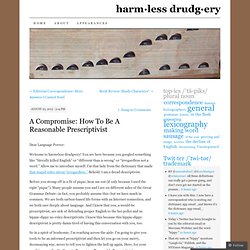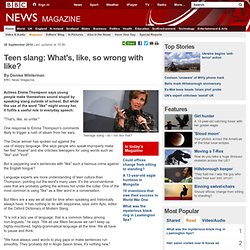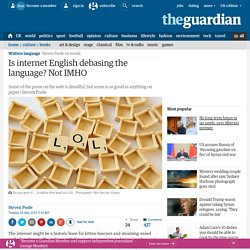

Something in common: should English be the official language of the EU? Money talks, especially in Brussels.

A billion euros are usually "mil milhoes de euros" in Portuguese, or a thousand million. In Spanish, likewise, "billón" means a million million, so billion is "mil millones de euros". Japan’s New Business Language by Hiroshi Mikitani. TOKYO – Five years ago, I stood before several thousand mostly native Japanese speakers and addressed them in English.

From now on, I told them, Rakuten – Japan’s largest online marketplace, of which I am CEO – would conduct all of its business, from official meetings to internal emails, in English. I still remember the shocked expressions on listeners’ faces. Their reaction was certainly understandable. No major Japanese company had ever changed its official language. But the simple fact is that adopting the English language is vital to the long-term competitiveness of Japanese business.
Saving the IMF. Tanzania dumps English as its official language in schools, opts for Kiswahili. Tanzania is set to become the first sub-Saharan African country to use an African language as the medium of instruction throughout the schooling years.

As part of far-reaching plans to reform education, President Jakaya Kikwete’s administration announced last week that, going forward, education in Tanzania will have Kiswahili as the sole language of instruction. Currently, public education in Tanzania is bilingual, as it has been since the country’s independence from the British in 1961. At primary level, students are taught in Kiswahili, with English a part of the curriculum as a language subject.
At secondary school level, and all the way up to university, the learning process is reversed, with English becoming the medium of instruction. English or Hinglish - which will India choose? 26 November 2012Last updated at 19:02 ET By Zareer Masani Writer and broadcaster Today's aspirational Indians want their children to go to a school where lessons are taught in English. But often the pupils leave speaking a language that would not be recognised in London or New York. How dialects from Trinidad to Hawaii are expanding the limits of English. Here’s a post from Nina Porzucki.

There are probably as many terms for different kinds of English vernacular as there are vernaculars themselves: pidgin, patois, slang, creole dialect and so on. But while we usually think of the vernaculars as oral versions of the English language, they’re making their way into the written word as well. “There’s a really interesting paradox going on, where you’re taking something that’s constantly changing — and that people don’t expect to see written down — and you’re making it codified and setting it down for a wider audience,” says Dohra Ahmad, editor of an anthology of vernacular literature called Rotten English.
M. NourbeSe Philip (pictured above) is one of the authors included in the anthology. “You can’t write it exactly as the person speaks it,” she says. She writes both in dialect and in standard English, with her characters switching back and forth between the Englishes. Students want English as medium of instruction. What the World Will Speak in 2115. In 1880 a Bavarian priest created a language that he hoped the whole world could use.

He mixed words from French, German and English and gave his creation the name Volapük, which didn’t do it any favors. Worse, Volapük was hard to use, sprinkled with odd sounds and case endings like Latin. It made a splash for a few years but was soon pushed aside by another invented language, Esperanto, which had a lyrical name and was much easier to master. A game learner could pick up its rules of usage in an afternoon. But it didn’t matter. English will fragment into 'global dialects' English as a global language flashcards. Jay Walker: The world's English mania. Attitudes. Why Can’t Johnny Write? Don’t Blame Social Media.
Books were my best friends, when I was growing up.

I read all the time, but wrote little. It wasn’t until I hit my teens that I began to write regularly for fun. None of it was very good, but I had, thanks to countless hours between book covers, learned a little something about structure, grammar, even spelling. This made me a better-than-average writer for my age and someone who peppered his conversations with big words (mostly because I loved the sound of them). My teenage children read less than I did when I was their age. Despite the generational shift in reading habits, my children are above average writers (although this could be because their parents have writing backgrounds). David Abulafia would be surprised, too. Facebook and Twitter are sending essay skills “down the plug hole.” Facebook and Twitter are sending essay skills “down the plug hole.” Abulafia unloaded on Twitter’s 140-character limit, according to reports. “People no longer know how to write. A Compromise: How To Be A Reasonable Prescriptivist. Dear Language Peever: Welcome to harm•less drudg•ery!

You are here because you googled something like “literally killed English” or “different than is wrong” or “irregardless not a word.” Allow me to introduce myself: I’m that lady from the dictionary that made that stupid video about “irregardless.” Behold: I am a dread descriptivist. Language Wars. From the first time we step into an English class, we’re told that the rules matter, that they must be followed, that we must know when it’s appropriate to use a comma and what it means to employ the subjunctive mood.

But do these things really matter? Outside of the classroom, what difference does it make if we write “who” instead of “whom” or say “good” instead of “well”? It does make a difference, at least sometimes. In order to determine when those times are, the question must be asked: For whom are you writing? Teen slang: What's, like, so wrong with like? 28 September 2010Last updated at 15:50 By Denise Winterman BBC News Magazine Teenage slang - do I not like that?

Actress Emma Thompson says young people make themselves sound stupid by speaking slang outside of school. But while the use of the word "like" might annoy her, it fulfils a useful role in everyday speech. "That's, like, so unfair. " One response to Emma Thompson's comments likely to trigger a rush of steam from her ears. The Oscar winner has spoken out against the use of sloppy language. Fascist Workplace Phonics or: How i learned to stop worrying and love phonology Fascism. Is internet English debasing the language? Not IMHO.
The internet might be a historic boon for kitten-fanciers and steaming-eared trolls, but it's not all good news.

Online writing, you see, is destroying the purity of English as we know it and threatening to dumb us all down into a herd of screen-jabbing illiterates. Or so runs one regular technophobic complaint, the latest version of which has been offered by Robert McCrum. 2b or not 2b: David Crystal on why texting is good for language. Last year, in a newspaper article headed "I h8 txt msgs: How texting is wrecking our language", John Humphrys argued that texters are "vandals who are doing to our language what Genghis Khan did to his neighbours 800 years ago. They are destroying it: pillaging our punctuation; savaging our sentences; raping our vocabulary. And they must be stopped. " As a new variety of language, texting has been condemned as "textese", "slanguage", a "digital virus".
According to John Sutherland of University College London, writing in this paper in 2002, it is "bleak, bald, sad shorthand. Drab shrinktalk ... Ever since the arrival of printing - thought to be the invention of the devil because it would put false opinions into people's minds - people have been arguing that new technology would have disastrous consequences for language.
The slow start, it seems, was because the companies had trouble working out reliable ways of charging for the new service. ("Too wise you are . . . ") can dampen today. 'Only pizzas are delivered': Public sector jargon banned in first style guide for Government announcements - UK Politics - UK. But no more. Britain’s cadre of real life civil servants have finally been banned from using the jargon that has kept the comedy writers from Yes Minister to the Thick Of It in gags for years.
Officials have been issued with an online style guide that tells them, for the first time, what unacceptable Whitehallese is. Out goes ‘deliver’.